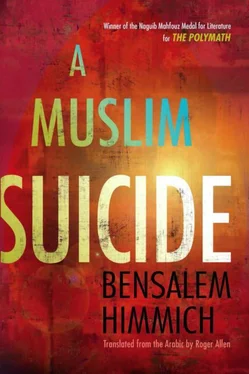When I noticed that they had all finished eating and drinking, I extended my greetings and compliments to everyone present and urged on them all the virtues of useful learning and honest work. I went on to pray that they would all be successful in whatever they undertook in the cause of God and the community of Muslims. They were delighted to hear my words. Standing up to say their farewells, they prepared to leave, while I promised to meet them all in the afternoon of the following day, Monday, in the great mosque of the city.
I asked the trio to stay behind, and they in turn asked if a young man named Khalid from Tangier could stay with them, he being a convert of Gothic origin. They took turns in extolling his virtues, his politeness and integrity. Among his qualities was his competence in both Castilian Spanish and Latin. The only thing they held against him, at least in my presence, was his distaste for marriage and his great passion for travel. The young man, who was sturdily built, brownskinned, and handsome, justified his love of travel by saying that he could only stay in one particular place for a month before he felt the urge to move somewhere else. He told us that he found it relaxing to keep moving house, clarifying his views by stating that he would continue doing so until he had completed his wanderings by settling by the Ka`ba in Mecca. That last statement was one that I found very pleasing, and it served as a prelude to my decision to adopt this child of Tangier as one of my close associates.
The first thing I asked for was details of how `Amr from Cordoba had died. They confirmed what I had already heard and went on to say that they had duly performed all the necessary rituals at his graveside in the one remaining Muslim cemetery in the Murcia region, which in any case was no longer big enough to hold the ever-increasing number of people who were dying. Hearing all this, I expressed my deepest regret over the death of this young martyr and prayed for his soul.
I then asked them for news about their own lives. They told me that, apart from Khalid from Tangier-stubborn bachelor that he was, they were all married and had children. 'Adnan, who had a reputation for witticisms, pointed out that, in Granada, every single young man of twenty or so had to have a girl with whom he could share the task of increasing the pomegranate crop on both banks of the River Genil or else somewhere in the copses, orchards, and gorgeous meadows of the region-all of it, of course, on the path to a legitimate union!
I was sure that 'Adnan was right, but avoided any exploration of the topic with 'Abd al because I did not wish to disturb him by mentioning his first marriage to the Jewish girl, Rachel, and her pseudo-conversion to Islam. Instead I asked them all about people and politics in Granada. I gave them a brief summary of what I knew: The Banu Ahmar were now in control of the city and of Almeria as well, but people were scared and felt insecure. The only thing that was keeping the Christians from further attacks was that they were all fighting among themselves. But that would not last very long, and, once things were more settled, they would once again be attacking the Muslims and their strongholds in southern Spain. I asked them whether Amir Ibn al-Ahmar was not in fact allying himself with the Castilian tyrant king, Ferdinand.
"Yes, indeed he is," `Abd al replied. "He pays him taxes and keeps sending him all kinds of gifts. The whole point is to give him enough power to oppose his own family and community."
"The only reason why he is known as `the Conqueror,"' Al-Sadiq went on, "is because he has beaten his fellow Muslim amirs. But, when it comes to King Ferdinand, he's all subservience and fealty."
They then took turns in providing me with snippets of information about people in Granada. I found myself having to adjust to the images presented by their accounts of extreme shortages and their loss of hope for this chaotic world, a world in which they were being forced to eke out a living, each one of them doing his best to work things out, either expecting something major to happen at any moment or else seriously thinking about exile.
For my part I told them about Sabta and the Maghrib. I pointed out that, while it was certainly true that-if only for a while-the current position of the Nasrids in Granada could be explained by infighting among the Christian rulers, the weakness of the Almohad sultan and his predecessors such as 'Abd al-Wahid al-Rashid,* who had drowned in one of the pools in his palace, and `Ali al-Said, who had taken his place, was equally to blame. I reminded them all that, quite apart from the urgent need to supervise the implementation of God's injunctions, any vestige of hope seemed at that point to reside with the Hafsid rulers in Tunis, who seemed eager to revive the former power and authority of the Almohads in the countries of the Maghrib. After a pause I also alluded to another source of hope, namely the fact that Frederic, king of Sicily, seemed to be favorably inclined toward the Muslim peoples and certainly admired their learning in opposition to the power of the pope in Rome and the arrogant attitudes of the Crusaders. I gave them all a brief summary of my correspondence with this Christian ruler and the circumstances in which it had come about. I then explained that I had only responded to his subversive questions in order to get him to lend his support to a Muslim victory in Spain and the Maghrib that would be achieved by dint of preparedness and experience first of all but also by force of arms if needed, all based on the assumption that both he and his people would accommodate themselves to Islam and be guided by its illumination. I went on to inform my students that during the process I had turned down all his gifts and generous donations.
The students were amazed and delighted by what I had told them and asked for further details about the conclusion of this felicitous correspondence. I told them that the king had yet to respond to my suggestion. If he were to meet me and offer measures that would benefit our countries and God's servants who were living in them, then I would be among his most fervent supporters.
"Dear teacher," said Abd al-Ali, "by the right of the worshipped God, I assure you that, during these long months past, the only thing that has kept us away from your presence has been our own petty concerns and the new circumstances in which we find ourselves in Granada, not to mention our fervent desire that you be allowed to retreat to Jabal Musa and devote yourself to learning and devotion."
"And don't forget, 'Ali," 'Adnan went on, "that we've been neglecting our studies, the kind of thing that makes our master happy. I think we should all emigrate to Sabta so we can be close to our master and benefit still further from his erudition."
"No, no, Adnan!" I replied immediately. "You and your companions should stay where you are. Don't even think of leaving unless, as was the case with me, some emergency situation or urgent need demands that you do so. You can travel the distance between us fairly easily whenever possible. If it weren't for the fact that I'm not allowed to cross back into Spain, I would make the journey myself."
`Ali and his companions all signaled that they understood. "No, master," he said, "we will make the journey. Spies and intriguers of all kinds keep on collecting bits of information about you, Sir. For your sake and ours, it's much better for you to stay here where you can be safe with your family."
At that point Khalid was looking at the floor, as though something important was on his mind. When I asked him what was bothering him, he asked me to tell him about my responses to the Christian king. I gave him a copy of them, and he looked at them carefully, first at the summaries, then at the seals. He then read the following out loud:
Читать дальше












